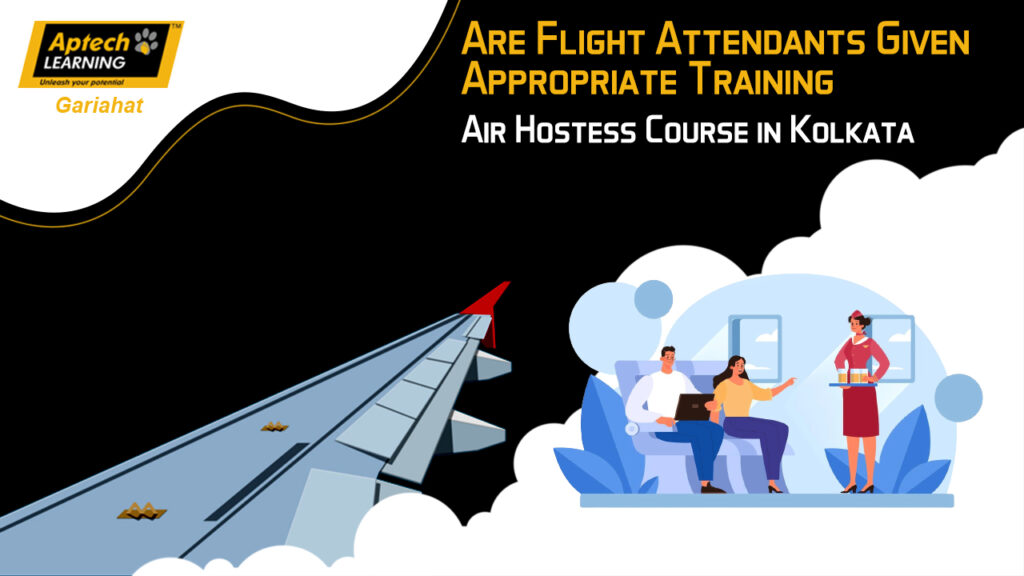Private and commercial airlines hire flight attendants to keep passengers safe and comfortable. They assist passengers in securing their seats, demonstrate how to operate the plane’s safety systems, and serve food, drink, and other amenities. All airlines are required by law to have flight attendants on staff to ensure the safety of their customers. Let’s understand some of the Appropriate flight attendant training standards:
Appropriate flight attendant training standards include:
- Attending pilot preflight briefings to obtain flight information on each trip
- Before each flight, emergency equipment is inspected.
- Keeping the plane’s cabin clean and well-stocked with food and beverages
- Ensure that all passengers are ready for takeoff and landing.
- Passengers with special needs, tiny children, or who require medical assistance are assisted.
- Responding to obnoxious passengers and keeping an eye on the plane for suspicious activity
- Assisting passengers in locating and using safety devices, putting out fires, and guiding evacuations in the event of an emergency
- Any safety or medical issues that occurred during a flight should be reported.
Requirements for flight attendants
You must be at least 18 years old, have a valid passport, have 20/40 eyesight, and pass a drug test and background check to be recruited as a flight attendants. You may also be required to pass a medical exam and meet the height requirements of the airline. Flight attendants should present themselves professionally and provide outstanding customer service.
Education
Flight attendants must have a high school diploma and, ideally, a bachelor’s or associate’s degree. Rather than attending college, some people engage in flight attendant training. You may need to take foreign language classes if you wish to work on overseas planes.
Training
To learn customer service abilities, most flight attendants require a year or two of work experience. Once hired as a flight attendants, they must complete three to six weeks of airline-provided training, with some cases lasting up to six months. Flying attendants study safety and emergency procedures, first aid, flight laws, and job obligations throughout this training time. They practice flying as well.
Certifications
Flight attendants must have one of the following certifications:
Certificate of Demonstrated Proficiency from the FAA
This is a necessary certificate that flight attendants acquire after finishing their on-the-job training and passing an exam. Each type of aircraft that flight attendants operate on requires training and certification. They must also continue to receive training each year in order to maintain their certification.
Certificate Programs for Flight Attendants
The Inflight Institute, for example, offers certification programmes based on the kind of airline: charter, regional, national, or international. Before being employed, their partner airlines require flight attendants to complete these online courses, which include topics such as aviation vocabulary, safety procedures, and passenger handling.
Skills
Flight attendants are often people-oriented and have excellent customer service abilities. They also enjoy travelling and experiencing new locations, and they are willing to work long or irregular hours. The following are some of the skills that flight attendants require to be successful:
- Flight attendants must pay close attention to passengers for any difficulties or suspicious activities. They must also be thorough while inspecting equipment and individuals for safety.
- When delivering safety demonstrations and communicating with passengers and crew, flight attendants should be able to speak clearly and convincingly. They should be polite and have good listening abilities as well.
- Stamina: Flight attendants frequently perform long shifts, deal with difficult passengers, and transport heavy goods like bags and service carts. They are also frequently on their feet.
- Efficiency: To ensure an on-time departure, flight attendants must conduct pre-flight chores promptly and effectively. They must also provide in-flight services in the period allotted for them to be in the air.
- Flight attendants must take command in the event of an emergency and make swift judgments to guide passengers to safety.
Working conditions for flight attendants
Part-time or full-time flight attendants are available. They could work for a commercial airline, a corporate airline, a regional airline, or an international airline. Because airlines operate 24 hours a day, 7 days a week, year-round, on holidays and weekends, they work unusual hours and schedules. Most airlines limit flight attendants to 12 hours of work each day, however foreign flights may necessitate longer shifts. Flight attendants must take at least nine hours off between shifts, according to the FAA. They frequently stay in motels in between flights and may be gone for days at a time.
Flight attendants work part of the day in the air and half of the day on the ground, preparing for or waiting for the next flight. When flying, they collaborate with other members of the flight crew in the plane’s cabin. The job of a flight attendant can be stressful at times since they must deal with aggressive or frightened passengers, respond to crises and air turbulence, and stand for lengthy periods of time.
Before flight attendants may choose their schedule and location, they must often obtain years of experience and seniority. Many flight attendants prefer to reside near their base airport so that they can get to work quickly, especially if they are called in unexpectedly.
These were some of the appropriate flight attendant training standards.


